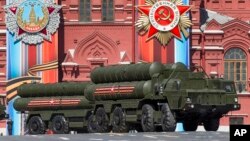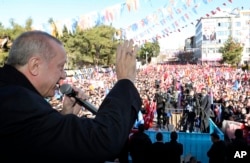Turkish President Recep Tayyip Erdogan has reaffirmed his commitment to buy a Russian missile system in the face of renewed warnings from NATO ally the United States. The prospect of a clash between Ankara and Washington has grown, with Moscow moving the delivery date for the missiles to this year.
Erdogan is blaming Washington for the deepening crisis over the procurement of Russia's S-400 missile system. The Turkish president says the missiles are the most cost-effective solution for the country's defense needs.
"Having the S-400 from Russia is an outcome of this pursuit," Erdogan declared to supporters Monday. "Now [Washington], you tell us to give up purchasing the S-400 [but] … don't provide us joint production and financial support."
Washington is offering its Patriot missile system as an alternative to the S-400, but talks have stalled over sharing of technology and price.
Turkey's NATO allies warn the S-400 compromises its defense systems. America's advanced F-35 fighter jet is seen as particularly vulnerable, given that Ankara is part of the international consortium building the plane.
"We will not stand idly by while NATO allies purchase weapons from our adversaries," said U.S. Vice President Mike Pence on Sunday, in a thinly veiled warning to Ankara. "We cannot ensure the defense of the West if our allies grow dependent on the East."
Time is running out for the NATO allies to resolve the impasse, now that the S-400 delivery date has been moved up. "We have signed the contract and we will complete the deliveries by the end of this year. We will deliver all the systems this year," said Sergei Chemezov, the CEO of Rostec, the missile manufacturer.
"Turkey seems to have closed the Patriot [missile] subject with the Americans while accelerating the S-400 deployment process," wrote columnist Serkan Demirtas of the pro-government Hurriyet Daily News. "This may lead to important consequences in defense ties between the two countries as well as on political bonds."
Analyst Sinan Ulgen of the Istanbul-based Edam research organization warned, "There are likely some quite serious consequences, with potentially punitive sanctions.
"It could also lead to the [U.S.] suspending the delivery of the F-35 fighter," he added. "But also other projects like the purchase of F-16s and military helicopters that would be affected if this [S-400] purchase would go through. The escalation in tensions between Turkey and the U.S. would be significant, in terms affecting Turkey's political risk [to international investors]."
Sanctions
Turkey's economy is still reeling from a 2018 spat with Washington. Last year, the Turkish currency collapsed after U.S. President Donald Trump hit Ankara with sanctions over the detention in Turkey of American pastor Andrew Brunson, who has since been released. Although the sanctions lasted only a few weeks, Turkey's economy now faces a recession.
"The U.S. talks about sanctions. Why? So that everyone can buy their products," said Russian presidential spokesman Dimitri Peskov in an interview Sunday with Turkey's Hurriyet newspaper. "The same pressure is now being put on Turkey. Only a handful of countries can show resilience. Turkey is one of them."
Analysts say Moscow views the S-400 missile deal as a means to sow discord within NATO. Turkey's NATO partners are already unnerved by deepening Turkish-Russian relations facilitated by cooperation in efforts to end the Syrian civil war.
Russian President Vladimir Putin likes to characterize ties with Turkey as strategic, however Ulgen suggests the relationship is more of a temporary affair. "Turkey does not see Russia as a strategic ally. On many of the regional issues, the positioning is different," Ulgen said.
"Turkey has not recognized Russia's annexation of Crimea," he added. "It has criticized Russia on Ukraine and then there is the baggage of history, so it's difficult at this point in time to talk about Turkey and Russia becoming strategic allies."
Elections in Turkey
With Erdogan in the midst of campaigning in competitive and important local elections, the anti-U.S. card plays well among his voters. Standing up to Washington over the S-400 missiles, analysts say, is part of the same narrative.
After the March elections, Turkey is not scheduled for polls for another four years. That could free Erdogan's hand for potentially difficult realignments in foreign policy.
"I don't believe Erdogan will look into the eyes of Putin and tell him, 'Look my friend, it's over now. Our love affair. I have a new boyfriend, the blonde guy in Washington, D.C.,'" said former senior Turkish diplomat Aydin Selcen. "It's not going to happen that way. But we will see somehow, the effects of this change in policy."
The dropping of the S-400 missile could be one of the first steps in realigning relations.
"The S-400 may be the best and most cost effective, but political cost with Washington could be much higher," Ulgen said. "Ankara can either negotiate with Russia in order for Moscow to sell this system to another country — we've seen Russia selling to China and India — or Turkey use this down payment on S-400 to buy another system. If the Russian treasury is paid or compensated, there is no reason for diplomatic fallout."







